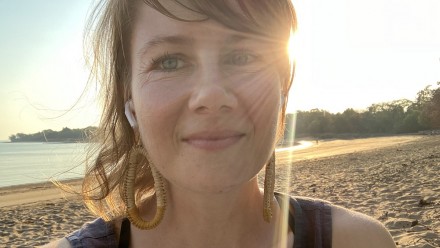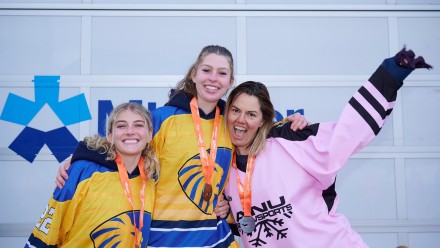Meet Lorane Gaborit, the first Bill Nicholes 'Willigobung' Scholar
Lorane Gaborit is the first student to be awarded the Bill Nicholes ‘Willigobung’ Scholarship. She tells us why she decided to study medicine and recalls her first few exciting weeks at medical school.
When did you know that you wanted to study medicine?
I think that from a young age I knew I wanted to work in a field where I could make a positive impact. It sounds really clichéd but I knew I wanted to work to help others, and so when I first finished school I really thought about medicine, but I actually decided to go down the social science route which is how I ended up in international development.
I studied development studies at ANU which is an interdisciplinary degree that kind of crosses the lines between anthropology, politics, economics and sociology. I was drawn to it because it's so holistic, there is no real way to look at development purely in terms of maths or ethics or politics; it’s a very grey area.
During my first year at ANU, I took electives in science, though I was actually awful at chemistry and it put me off science for a while as I felt like I didn’t have the right skills or innate talent for science. I guess now I’m glad I felt so inherently drawn to the practice of medicine regardless, and had the right mentors around me to emphasise that medicine is much more than just straight science. There is definitely a stereotype that doctors are science-focused, ‘book smart’ high achievers and that is true to an extent but there is so much else to it. If you’ve got the right intentions and the passion for medicine but don’t think you match that sort of stereotype, you just need to apply and put yourself out there.
Throughout my undergraduate degree, I was lucky enough to spend some time in a couple of different rural and remote parts of Australia, where I met a lot of amazing people, particularly Aboriginal and Torres Strait Islander people, who were working in the health sector in their communities. I became really interested in Indigenous health, and other aspects of community healthcare provision like cultural safety and health justice. I think this was not only because I witnessed a great deal of inequality between the level of care that was being received in those communities compared to my own experiences but also because I was really inspired by the resilience and strength of these communities. Indigenous health is so often talked about in a one-way direction, but the flow of knowledge and skills goes both ways. The notion of a two-way partnership was something that always interested me in development because traditionally, development has so often been looked at from a western to non-western perspective, but there is so much that can come from flipping the perspective the other way around.
So, did you have a vision that you'd bring in the development side of things to your study of medicine?
Yes, absolutely. I think in the world we live in now it would be very difficult to practice anything without an understanding and regard for the global world, culture and diversity. It’s a challenge but I think it is mostly an opportunity for enrichment. Myself, I am a first-generation Australian. I was born in France and lived in Mauritius before moving to Australia, and was brought up to look very broadly at the world and appreciate different cultures and knowledge systems.
During my undergraduate degree I completed a language minor in Arabic, and I am still really motivated to one-day work for an international health organisation like Doctors without Borders or the World Health Organisation. But more recently I have also been really inspired by organisations like the Fred Hollows Foundation or Lions Outback Vision who are working within Australia. Last year I worked in policy and communications for the Australian Indigenous Doctors Association, which was an absolute privilege and an area I really hope I will be able to learn more from in the future. The way that we communicate as doctors with migrants and people who are from different cultural contexts is extremely important to achieving good outcomes. I am hoping to be part of the Indigenous Health stream and to work on a research project looking at these sorts of issues.
What have you done in your first few months at Medical School?
From my perspective the first few months have been primarily focused around bringing everyone up to a level playing field in terms of basic biomedical science knowledge and skills. So it has been filled with a lot of really dense classes and very high intensity learning. The idea of doing an intensive biomedical bridging course in two months sounds really intimidating but it has actually been a very supportive environment with plenty of great clinical activities and lessons thrown in to keep everyone hungry for more. Starting to do clinical skills from the very beginning was definitely not something I expected.
I think it was at the end of my very first week of med that I had the opportunity to take blood pressures at the Multicultural festival in Canberra with the Global Health Society. That was pretty special. When you’re interacting with members of the community around something like taking a blood pressure, it’s actually an excellent way to communicate about health interactively, it reminds you about why you even wanted to start medicine in the first place. Next week, we’re going on rural week. I’m looking forward to attending that and having the opportunity to engage with a nearby rural community and hear stories from local doctors and patients.
How has the experience been so far?
It's definitely been a big change but not necessarily in the ways I expected. Even though the science content we are learning is a completely different kind of knowledge to that I have been used to, I find I am still applying the same skills I needed in my arts degree and in health policy and communications, such as skills in synthesising information, asking good questions, and thinking about short and long term implications.
Maybe I’m biased but the community at ANU and the ANU medical school is really great. I think you can really tell the difference that it is such a small medical school. Everyone is very supportive and caring. Even within just a few days, almost everyone knows you by name, your professors know you by name and that's really important, especially when you may feel a bit out of place, in my case having come from a non-science background but for others from having moved far from home.
During O week, I was surprised by how much time the medical school and older medical students dedicated to talking about issues like sexual harassment, bullying, and mental health. It didn't feel like it was just a tick in the box, they really took the time to answer people's questions and concerns. It helps to make you feel like the university and medical school here take you really seriously, along with whatever your particular interests might be, they want to support you to focus on it.
When you do a postgraduate medical course, you meet people who have led these crazy past lives which seem completely unrelated to medicine, alongside many other people who seem to have been waiting to do med their whole life. I think deep down I am one of those people even if I didn’t realise it initially and it is really exciting and a huge privilege to be able to look ahead to everything that is to come.
...
Lorane was a Tuckwell Scholar and applied to study Medicine at ANU through the Tuckwell Scholarship to Medicine Pathway which you can find our more about here.














